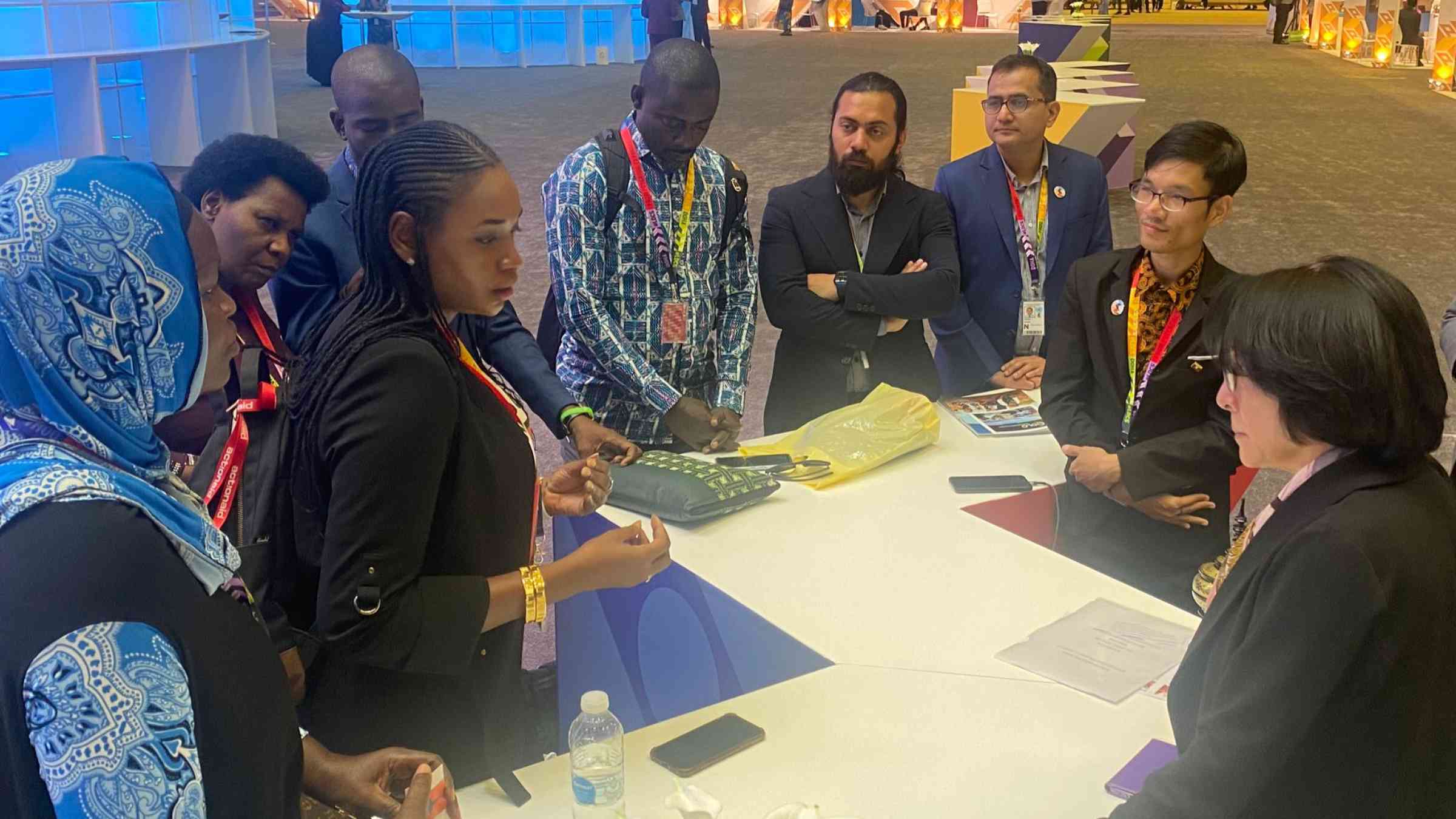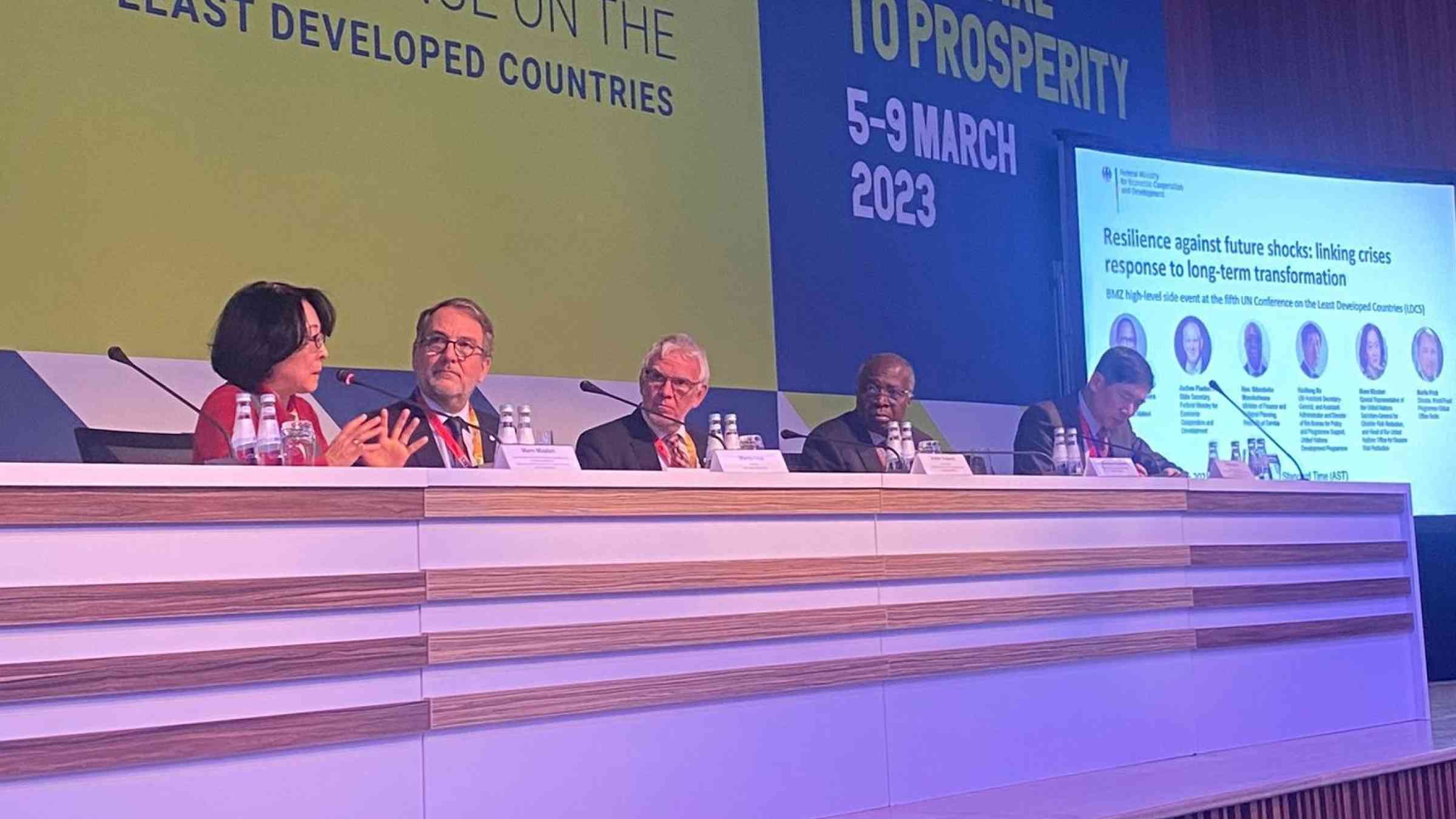At LDC5, UNDRR makes the case for risk-informed development

A year after the adoption of the Doha Programme of Action for the Least Developed Countries (LDCs), it has become clearer than ever the importance of helping LDCs build their disaster resilience to protect their development gains.
Disasters not only kill more people in LDCs than anywhere else, as they account for 70 per cent of climate-related disaster deaths, but also inflict greater damage on their economies compared to the richest countries. This hampers the achievement of the Sustainable Development Goals and could threaten the graduation of LDCs.
That is why the UN Office of Disaster Risk Reduction (UNDRR) participated actively in the second part of the 5th United Nations Conference for the Least Developed Countries (LDC5), which was hosted by Qatar on 5-9 March 2023.
“We cannot allow countries to fall back down the development ladder after working so hard to climb it,” said UN Secretary-General, Mr. António Guterres, who was in Doha for the LDC Leaders Summit ahead of the conference.
The UNDRR delegation, headed by Ms. Mami Mizutori, Special Representative of the UN Secretary-General for Disaster Risk Reduction and Head of UNDRR, engaged with presidents, prime ministers, and foreign ministers from LDCs as well as donor governments. In addition, UNDRR participated in events and hosted an exhibition booth to emphasize the centrality of disaster risk reduction to the resilience and development of LDCs.
UNDRR also hosted its own side event to showcase some of the offers of support from the United Nations system and its partners to address the challenges and bottlenecks faced by LDCs in their implementation of the Sendai Framework for Disaster Risk Reduction and the Doha Programme of Action.

The event featured speakers from donor countries, represented by Ms. Chrysoula Zacharopoulou, France’s Minister of State for Development, Francophonie and International Partnerships; LDC officials, represented by Ms. Rebecca Yei Kamara, Member of Sierra Leon’s Parliament; and the private sector, represented by Mr. Chris Sharrock, Vice President for UN Affairs and International Organisations at Microsoft, in addition to Mr. Addessou Kossivi, as a representative of the Global Network of
Civil Society Organisations for Disaster Reduction (GNDR) and Mr. Pradip Khatiwada, as a youth representative from Nepal.
“Over the years in Sierra Leon, we have had years of war, followed the Ebola disaster and after that, mudslides which killed and displaced thousands of people, and this was before the COVID pandemic,” said Ms. Kamara, adding:
“As we try to climb the ladder, disaster strikes and people become poorer… that is why in 2020, as legislators we passed the disaster management act, which made a provision for the establishment of the disaster management agency of Sierra Leon.”
In addition to protecting people and development, UNDRR highlighted the relevance of disaster risk reduction in unique contexts, such as during recovery or peacebuilding.
Speaking at an event organized by the UN Economic and Social Commission for Western Asia on supporting LDCs in conflict and fragile settings, Ms. Mizutori said:
“Disaster risk reduction, which is inherently cross-sectoral, can be the keystone that holds the triple nexus of sustainable development, humanitarian action and peacebuilding together.”

This also applies to helping countries leverage recovery to build long-term resilience, which was the focus of an event organized by Germany’s Federal Ministry for Economic Cooperation and Development (BMZ).
“Even after a shock has occurred, it is never too late to integrate a risk reduction perspective into response and recovery efforts. Indeed, every crisis or disaster can be an opportunity to trigger transformative change,” said Ms. Mizutori.
Building back better to build resilience against future shocks was also the theme of the LDC5 High-Level Thematic Roundtable 6, where Ms. Mizutori delivered the keynote address, noting that:
“The findings from our midterm review of the implementation of the Sendai Framework show that countries prefer to ‘build back the same’ than to ‘build back better.’ If we want a sustainable recovery and to protect lives and development from future crises and disasters, we must internalize these lessons and apply them.”
To ensure the aspirations of LDCs are captured in the political declaration that will be issued in New York at the High-Level Meeting of the UN General Assembly on the midterm review of the Sendai Framework, on 18-19 May, Ms. Mizutori invited all LDCs to attend and actively participate in the meeting.
On the margins of the conference, UNDRR also engaged with the media and with non-governmental stakeholder groups. This included five stakeholder representatives from LDCs that UNDRR sponsored to participate in LDC5.
As a next step to the conference, UNDRR will continue to engage with graduating LDCs to support countries to embed resilience in their ‘smooth transition’ strategies. UNDRR is also developing a guidance note on designing Integrated National Financing Frameworks that support national disaster risk reduction priorities. This document will be presented to the G20 Working Group on Disaster Risk Reduction later this month, and UNDRR hopes to pilot this approach in several LDCs later this year.
Because the countries that are farthest behind in achieving sustainable development, and are dealing with the results of a climate crisis they did not create, deserve the most support.